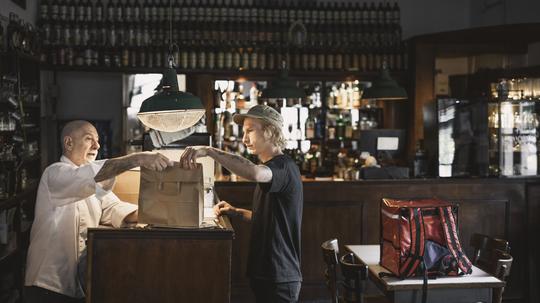
When Gov. Gina Raimondo's office ordered restaurants to close for all but takeout and delivery on March 17, Bywater simply shut down.
The restaurant, an upscale American joint in Warren, is independently owned. The staff didn't have the infrastructure necessary for takeout operations; in fact, they had never set up a platform where customers could order online, according to Amber van Moessner, a spokeswoman for restaurant management platform Upserve.
Bywater had long used Upserve for other parts of its operations: taking orders in its restaurant, processing payments. That's not unusual for Upserve's clients. In mid-March, just "a handful" of restaurants were using Upserve's online ordering system, van Moessner said.
"We have typically only sold our core platform product," said Sheryl Hoskins, who took over as Upserve's CEO in late 2018. "Our core platform product sits inside a restaurant to enable the operations of a restaurant. We really couldn't do that. That was not even a thing as restaurants started to shut down."
It's worth noting that Upserve makes money via transaction fees on credit card swipes. It does not charge commission fees for online orders, as its competitors like Grubhub and DoorDash do (and have recently come under fire for; restaurants' already-thin profit margins have been further diluted by fees amid the coronavirus pandemic). Upserve did, however, begin charging end users—customers ordering food—a new 5 percent fee and a 99-cent service fee on all online orders at the beginning of May, which it has since scaled back after complaints rolled in from restaurant owners.*
For Upserve, which launched 11 years ago and is now one of the most well-funded private companies in the state, it was sink or swim.
Upserve started by ensuring its existing customers were aware of the online ordering module. If that module was included in a restaurant's package but wasn't turned on, Upserve reached out to that restaurant to let them know they had options to generate revenue, even amid the restrictions.
Eventually, Upserve would bring online ordering beyond its existing customer base. As the company announced on May 11, Upserve is now offering its virtual point of sale (POS) and online ordering tools for free for 12 months to any restaurant.

With online ordering live, the next step was marketing. Restaurants needed to let potential customers know they were open for takeout or delivery. To scale that effort, Upserve launched a new program, offering restaurants up to 100 free ads on Facebook and Instagram to get the word out.
"During those last two and a half weeks of March, it was all hands on deck. We had our whole sales team doing cold calls to restaurants we had in our database," Hoskins said. "It was a little tough. Sometimes, there's no one answering. We found that sometimes, we just couldn't reach people."
In spite of that, Upserve's effort yielded results. From February to April, the startup saw a 169 percent increase in restaurants using its online ordering platform, van Moessner said.
Week-over-week online sales are increasing, too: 16 percent nationwide, 20 percent in suburban Rhode Island and 12 percent in Providence.
Bywater was among the restaurants that bounced back. Within a few weeks, the restaurant had brought back several of its staff members—everyone "within walking distance," van Moessner said—and returned to pre-coronavirus revenue levels. Much of that was due to online ordering. Another bulk of revenue, though, came through a new initiative. At Upserve's recommendation, Bywater began selling grocery products like bread and fish from its wholesale suppliers. That brought in another $13,000 just in the first week, van Moessner said.
"Everyone is pretty much new to this," van Moessner said. "No one has run a restaurant in a pandemic before."
A shifting work environment
Meanwhile, though, Upserve was hurting.
The startup's success is tightly coupled with that of the restaurant industry. According to an analysis by Toast, Upserve's competitor to the north in Boston, average daily sales at restaurants declined by nearly 80 percent toward the end of March. (Toast itself has hardly emerged unscathed; the startup cut 50 percent of its staff, more than 1,000 employees, in April.) A separate survey of nearly 6,000 small business owners conducted at the end of March found that 70 percent of restaurants and bars expected to go out of business if social-distancing orders last into July.
"We're not bringing in the same revenue as we did before. I think that's true of almost any business right now," van Moessner said. "We're in a global economic freeze of sorts at the moment. We're definitely not seeing our projected revenues, although we had an amazing Q4 and an amazing start to Q1."
By April, staring down these numbers, Upserve was forced to furlough a number of employees. van Moessner and Hoskins declined to give an exact number as to how many workers were affected, citing the fact that Upserve is privately held, but Hoskins said it is "commensurate with how the industry's been performing."
That number, in any case, has changed.
Every week, Hoskins and the leadership team examine a set of key metrics, including sales volume and the number of restaurants coming online. Throughout the month of May, Upserve was able to bring back some of the employees who had been furloughed.
All of Upserve's employees have been working remotely since Friday, March 13. That day was initially mean to be a test period teams could use to "work out any kinks," Hoskins said. It ended up being the first day of a work-from-home policy that is now expected to stretch through the end of 2020, a decision Hoskins announced to employees just last week.
"At this point, we're not anticipating when the office is going to open back up," Hoskins said. "To me, not only is their safety important, but their mental health and wellness is really important. An unhealthy employee is not good for anybody—the employee or the company."
To that end, Upserve has also begun recommending that every employee take up to three "wellness days" each month to avoid burnout.
"It's use it or lose it," Hoskins said. "You need to be outside for a few."
What's next for restaurants
Upserve operates in all 50 states. As a result, it is servicing restaurants that are working to comply with 50 entirely different sets of restrictions, each of them lifting at different times—and many of those policies fraught with debate.
In Rhode Island, restaurants have been allowed to reopen for outdoor dining since May 18. Raimondo said earlier this week that she hopes to move forward with the second phase of reopening the state’s economy on Monday, June 1, a phase that would include indoor dining. Warring factions of Rhode Island restaurant owners stand on either side of this plan: The "Ocean State Coalition" has spent the past few weeks lobbying for Raimondo's position, while a separate group has called it "irresponsible, short-sighted and dangerous."
For its own part, Upserve has been working to provide resources to restaurants that are weighing whether or not to reopen. In its in-house publication, "Restaurant Insider," Upserve has published articles like "6 Ways to Prepare Your Restaurant for Reopening After the Coronavirus Pandemic" and "Reopening Checklist: Get Your Restaurant Ready to Welcome Back Dine-in Guests When the Time is Right."
These articles contain specific guidance advising owners to ensure their employees understand ordering procedures, limit capacity for events and create a crisis management plan in case of future outbreaks.
That guidance is taken from specific case studies. van Moessner said the Upserve team has examined major metropolitan areas in East Asia, the original epicenter of the coronavirus, where restaurants were able to reopen months ago.
"There are all kinds of things—disclosure forms, personal protective equipment, staff working in contact groups—that our industry never had to think about before," van Moessner said. "The restaurant industry is on the front lines, especially when it comes to contact tracing. We're looking at everything from restaurant design to architecture."
Since early May, Upserve's customer success managers have sent personalized emails to restaurants to help them reopen. Each of those emails includes data points that might help: a restaurant's top three most popular menu items, for example, juxtaposed with the top three online ordering menu items across the country. On Thursday, Upserve also unveiled "AI 'Smart' Menu Optimization." Using machine learning data, a restaurant’s most popular menu items will dynamically appear at the top of the online ordering menu, highlighting high-performing dishes.
"They could see what types of menu items are in their system, but we also know they're really busy right now," Hoskins said. "They're hiring, buying food, getting a restaurant open. The more we can enable them by getting that information more readily and easily available, the better."
Hoskins' team is aware that restaurant owners may not be ready to open right away, even if local authorities allow them to. Reopening and recovery looks different for everyone. For now, Upserve can only gather data: monitoring sales in states like Alaska, which became the first state to fully reopen this week, and talking directly to restaurant owners to figure out the best path forward.
"We’re trying to find new ways to support our customers any way we can, using the resources we have on hand," van Moessner said. "Every day, we’re trying to innovate something new."
Update: We originally reported that Upserve did not charge commission fees for online orders. While it is true that Upserve does not charge fees to restaurants, it did begin charging fees to customers at the beginning of May, which we reported in a follow-up article published on June 5. This article has been updated to reflect the new information. Click here to go back to the top of the article.








